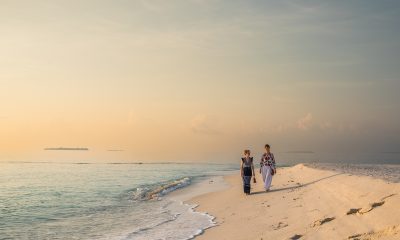Featured
Sonu Shivdasani: the ‘dream maker’ redefining luxury

It was 1986, and a 21-year-old Sonu Shivdasani was reading for an MA in English Literature at Oxford University when he met his future wife Eva Malmström. After their initial encounter, the Swedish fashion model introduced her British Indian partner to a patch of paradise in the Indian Ocean that she had visited a few years back on a photo shoot. She told him of the breath-taking natural beauty of the islands. She said they had to go there someday.
A year later, the couple arrived in Maldives for winter holidays. They stayed at Nakatchafushi (now Huvafen Fushi Maldives). Like Eva, Sonu was instantly drawn to the natural beauty of the Maldives.
“I think we had lived here in a past life. It was definitely a strong affinity to being in the Maldives. We loved the geography,” Sonu recalls his first impressions of the Maldives.

Sonu and Eva. PHOTO/ SONEVA
A few years later, Sonu and Eva returned to the Maldives, this time staying at Cocoa Island (now COMO Cocoa Island), which was then operated by German photographer Erik Klemm. But the standards of hospitality offered by the handful of resorts operating at the time were a major turn-off. Coral walls, white tiled floors, plastic chairs, neon lights, salt water in the toilet and shower, and tinned fruits and vegetables didn’t appeal Sonu, son of a well-known Indian merchant and banker.
That’s when it occurred to him, why not lease an island and build a house here?
Selling the unsellable
In 1988, Sonu approached the government, but was told that an island could only be leased for tourism. It wasn’t something he had thought of. He had no knowledge and experience of building and running a hotel.
But Sonu took on the challenge. When the government began auctioning off islands in Ari Atoll in the early 1990s, Sonu bid for Athuruga, Thudufushi and Angaga – now three very successful resort islands. But the bids failed largely because Sonu didn’t have a bed contract with a tour operator.
“Those days Maldivian tourism was run by German and Italian tour operators. They went to a local who was farming coconuts and said, ‘Will you build a resort for us? We will give a 10-year contract, all-inclusive, a very low fixed price and a three-year deposit to finance the development’,” he explains.
“The government wanted to see a tour operator bed contract, but we didn’t want to do that. We wanted to create something luxurious, and we couldn’t work with just one operator, especially at those low rates. We put very nice bids together. We also offered much more lease rental, but fewer number of rooms. But we failed.”

Sonu speaks to Maldives Insider. PHOTO/ IBRAHIM ASAD
Then Sonu had a stroke of luck. He was introduced to an uninhabited island in Baa atoll that had been abandoned after a failed attempt by local businessman Ahmed Jaleel to operate a resort. After Jaleel offloaded the island, it had passed onto various developers. But no one wanted to develop and run it. Everyone thought the island was, as Sonu put it, jinxed!
Even so, Sonu acquired the lease on the island from Veyne Reed, Chairman of Australian travel company Treasure Island Enterprise. And with their family money, Sonu and Eva started building their dream house on the deserted island of Kunfunadhoo.
But to keep construction going and to complete the resort, they needed funds. They turned to local banks, but it proved to be a difficult task.
“The local banks didn’t believe in luxury tourism. We showed them our numbers; we were projecting an average net rate of 200 dollars per night. We went to the state bank [State Bank of India], and they said it was impossible. Even Kurumba, which was the best resort at the time, was doing 100 dollars per night. They didn’t understand the concept at all,” Sonu shares the initial frustrations he had to deal with.
Sonu was once again lucky. He discovered that the Thai government was mandating its banks to lend abroad. And so, he seized the opportunity and approached a Thai bank. Sonu’s proposal was amongst 20 loans – and the most successful of all – given out at the time by the bank’s newly formed division for international lending.
But there was a catch!
“They said, you know nothing about hotels. So, you need a hotel company to manage your hotel,” Sonu says.
He began looking around for a suitable management company. He wrote to legendary South African hotelier Sol Kerzner, who was running the Le Saint Géran hotel in the Indian Ocean island nation of Mauritius, as well as Regent Hotels Group, Four Seasons and Taj Hotels. But they – all of them would later come to open luxury resorts in the Maldives – then believed that the Maldives lacked the potential to be a luxury destination. Hilton and Sheraton expressed interest, but Sonu and Eva felt that both the corporate chains were completely opposite of what they had in mind.
Finally, Sonu had the opportunity to take an equity stake in a small hotel management company based in Thailand. It would later become known as Six Senses Hotels Resorts Spas.
Turning around a business
After resolving the issue of funds and management, Sonu now had to take care of the make or break challenge of guest transfer. Jaleel’s resort operation on Kunfunadhoo in the 1970s failed because bad weather often made it impossible for dhonis to travel. Guests from Europe, who took nine-hour flights to reach the Maldives, had to spend four days from their week-long packaged holiday in Male. Transfer issues forced Jaleel’s successors to abandon their plans as well.

Resolving transfer issues with helicopters was one of the main reasons behind the initial success of Soneva Fushi.
Sonu realised that the only way to resolve the issue was to transport guests by air. Since there was no domestic airport anywhere close to the island, he turned to Hummingbird Helicopters, which was about to close its business after about two years in operation. Their use of western-built helicopters with limited seating capacity and high rates didn’t appeal guests who had paid just 500 pounds for a one-week holiday, including international flights.
“We decided to take over the business. That was the time when communism collapsed all around the world. So, we went to Bulgaria and hired four helicopters from the Bulgarian state helicopter agency. The western helicopters went and these Russian helicopters came instead. They were better; they had 24 seats and a more solid build. They could carry 50 percent more people, were more suited to an environment like the Maldives and operating costs were dramatically lower,” Sonu says about the helicopter business, which he sold to his brother in 1997.
“From being impossible to transfer packaged tourists, we now could and make a profit. The rates dropped from USD 250 to USD 140 for a return trip. It was almost cheaper than going by boat.”
Challenging status quo
With everything in place, Sonu and Eva finished building their island home and opened it to visitors in 1995. Soneva Fushi became the first ‘castaway’ resort in the Maldives, pioneering a trend for back-to-nature luxury holidays – an experience Sonu calls ‘intelligent luxury’. The couple’s intensely personal vision of a locally crafted villa and environmentally responsible lifestyle challenged the long-held view of what luxury is.
“Luxury is a word that’s so often misused and misrepresented. When it comes to luxury, people often talk about marbles or golden gates and chandeliers. But luxury is not about objects. It’s a concept; a philosophy. Luxury is all about that which is rare, that which you don’t get every day, that which is new but is still true. It’s got to strike a chord in your heart,” Sonu explains.
For Sonu, luxury is packing for one’s own self; snorkelling gear, books and videos instead of suitcases full of suites, ties and dinner jackets to impress those they meet during their stay. It’s being able to walk barefoot, taking a shower and seeing the full moon, looking at the stars with the largest telescope in the Indian Ocean, watching a movie at Cinema Paradiso where the stars are in the sky as much as they are on the screen, eating a fresh salad from the garden, or the restaurant being just a natural sandbank.
“Those are things however wealthy you are, you can’t do or get in an urban environment. That’s what becomes luxury,” he says.

A Private Reserve at Soneva Fushi. PHOTO/ SONEVA
With its “no news, no shoes” slogan and authentic experiences that disconnect guests from the noisy world out there and reconnect them with nature, Soneva Fushi became an instant hit. It sent shockwaves through the hospitality industry, and kick-started a wave of new developments that transformed the Maldives from a three-star diving destination to the ultra-luxury island paradise that it is today. And Sonu, from being called “stupid” even by established local developers, became a visionary.
“We spoke to a lot of local developers who were involved in mass market offerings and they all thought our concept wouldn’t work. But now they too have upscale offerings. I think it’s kind of a vindication that those who thought it was a joke are now doing luxury developments,” Sonu says.
“I think people build hotels they want to be in and live in themselves. We didn’t come from the hotel industry. So, we were able to think from a consumer’s perspective, not from the operator’s perspective. Eva and I loved being on the water, we loved being on boats. We loved the fact that when you’re on a boat, you don’t wear shoes. It was something that really appealed to us; creating a luxury experience where there’s a lot of sand and a much more casual environment where people don’t have to dress up.”

The Glass Studio at Soneva Fushi. PHOTO/ SONEVA
Sonu didn’t just revolutionise Maldives tourism, but he also set an example of how it should be done. Soneva established a blueprint for barefoot luxury holidays around the world, with several firsts to its name: Maldives’ first integrated waste management centre, first Art and Glass Studio, and first to introduce a two percent carbon levy to offset carbon emissions. With buildings made from ethically-sourced highest quality sustainable materials, home-grown produce used in the kitchens, and comprehensive waste management and recycling programmes, Sonu and Eva has since amassed two decades of knowledge and experience in coining the concepts of SLOW LIFE, which recognises the ability for luxury holidaymaking and care for the environment to co-exist with perfect ease.
“Preserving the environment is an ongoing challenge, and I think we need to be very careful about that. The Maldives and its tourism industry exists because of the natural environment. If the corals don’t stay alive, the islands will eventually sink even if the sea level doesn’t rise. That’s what keeps the destination afloat, quite literally,” Sonu explains.
“It’s a very fragile environment and people are coming for that; for the diving, corals and natural beauty. If you’ve too many tourists, that will be a challenge. There’s certainly a carrying capacity in the Maldives, and I think it’s not more than four to five million tourists a year.”

A sandbank picnic experience offered by Soneva Fushi. PHOTO/ SONEVA
Making his mark
Following the success of Soneva Fushi, Sonu began receiving proposals from developers and owners from the world over to manage their hotels and resorts. And just like that, Six Senses – a company formed just to manage Sonu’s own resort – evolved into a multi-million-dollar global hotel empire, which at its peak had 26 resorts and 41 spas across Asia, the Middle East and Europe. A more economical brand, Evason was also launched to complement Six Senses.
In between the exponential global growth and perfecting the experiences at Soneva Fushi, Sonu developed Soneva Gili in the Male atoll as a transit point for guests arriving in the night. Instead of staying in Banyan Tree Vabbinfaru or the Four Seasons Resort Maldives at Kuda Huraa – the only two luxury resorts in Male atoll at the time – Asian guests with night flights could stay at Soneva Gili before taking out a seaplane to Soneva Fushi the following morning. Soneva brand itself also expanded beyond the shores of the Maldives with the opening of the spectacular Soneva Kiri on the unspoilt Thai island of Koh Kood in 2009.
But in 2012, Six Senses and Evason were sold to US-based Pegasus Capital for USD 175 million. Soneva Gili (now called Gili Lankanfushi, and managed by Singapore based HPL Hotels and Resorts) was also offloaded after the opening of a domestic airport in Baa atoll opened access to night flights and Male atoll became too crowded with a plethora of new developments.
“We wanted to be both the owner and operator of our hotels,” Sonu says.
“When you’re a hotel management company, you’re spending a lot of your energy and time on establishing standards, making sure the next property is not worse than the previous one rather than seeing whether you can improve on it. I think that’s a big challenge because a lot of hospitality is now very institutional. Fewer and fewer companies own more and more brands, and they’re growing through managing other people’s hotels. So, a lot of their time is spent on manging compromises between their brand and the owners.”
Returning to roots
Now focused on the Soneva Group, with its “One Owner, One Operator, One Philosophy, One Brand” strategy, Sonu no longer has to spend all his time at hotel conferences, and meeting investors and developers. This allows him to be creative; to introduce fresh concepts as well as new evolutions to what he is already doing.

Aerial view of Soneva Jani, the newest property of Soneva. PHOTO/ SONEVA
With his newfound freedom, Sonu along with his wife Eva, who serves as the Creative Director of Soneva, is back shaking up the hospitality industry. Since the sale of their management companies, they have launched Soneva in Aqua, a luxury cruise, and Soneva Jani in the northern Noonu atoll, a collection of overwater villas situated in a large lagoon and encircled by five islands. Two more concepts that “don’t exist in the Maldives today” will be introduced over the next three years to complement the jungle and beach experience of Soneva Fushi, and the lagoon experience of Soneva Jani. Next is taking the company public and expanding the philosophies of SLOWLIFE and ‘intelligent luxury’ they have perfected in remote locations to an urban environment like London.
“The idea of continuously improving and being creative, adding value and helping people – all these things keep me going. I can never just stop and stay in one place. I’ve to go backwards or forwards,” Sonu says.
Only time will tell which direction he will go. But it sure seems that even after two decades of shaping one-of-a-kind holistic holiday experiences that are inspired by nature – and perhaps by his admiration for the novel of Robinson Crusoe back in university – the literary graduate turned hotelier is unstoppable!
Note: This article originally appeared in the May-June issue of Maldives Insider Travel & Tourism, a bi-monthly travel magazine by Maldives Promotion House. You can read the digital version of the magazine on Issuu.
Drink
The Nautilus Maldives hosts Gregor Zimmermann for three-day Easter gastronomic programme

At The Nautilus Maldives, time is guided by personal rhythm and creativity is free from constraint. From 3 to 5 April 2026, the ultra-luxury private island resort will welcome Gregor Zimmermann, Switzerland’s State Chef and Executive Chef of the Bellevue Palace in Bern, for an intimate Easter culinary residency that brings Alpine heritage to the shores of the Indian Ocean.
During the three-day residency, guests will be invited to take part in a series of unhurried and immersive dining experiences. Two exclusive gourmet evenings at Zeytoun will feature tasting menus that create a refined dialogue between the flavours of the Swiss Alps and Maldivian produce. The programme also includes a Chocolate Masterclass, offering an interactive introduction to Switzerland’s celebrated chocolate-making traditions, where Zimmermann will share techniques, cultural heritage and the artistry behind the craft, allowing guests to create and enjoy their own confections.
The residency will extend into the island’s Easter celebrations, with Zimmermann’s creations appearing as special canapés during Nautilus Rising at the Naiboli Beach pop-up. These moments will serve as a prelude to the festive programme, blending culinary artistry with the relaxed rhythm of island life.
A member of the prestigious Le Club des Chefs des Chefs, the international association of chefs serving heads of state, Zimmermann is the trusted culinary custodian for visiting presidents, royalty and official delegations in Switzerland. His career includes cooking for figures such as President Emmanuel Macron and members of European royal families. In recognition of his contribution to gastronomy and his commitment to excellence, he was awarded the Officier du Mérite Agricole by the French President.
Zimmermann’s cuisine is defined by clarity, restraint and emotion. Rather than adhering to a fixed signature style, his cooking reflects stories of origin, landscape and memory, weaving Swiss Alpine traditions with global influences in a technically precise yet expressive approach. He has described his work as a continuous reinterpretation of rustic Swiss recipes, while remaining faithful to their roots.
Adan Gomez, General Manager of The Nautilus Maldives, said that Zimmermann’s residency reflects the resort’s commitment to artistic freedom and authenticity. He noted that the Masters for Masters series invites respected global talents to create without boundaries in an environment shaped by individuality and unhurried living.
Set within the Baa Atoll UNESCO Biosphere Reserve, the Easter residency at The Nautilus will bring together Swiss craftsmanship and Maldivian serenity in a celebration of purity, artistry and cultural exchange. The programme is designed to offer guests moments shaped by mastery, experienced entirely on their own terms.
Featured
St. Regis Maldives Vommuli Resort curates timeless Valentine’s experiences with IVAR Jewellery
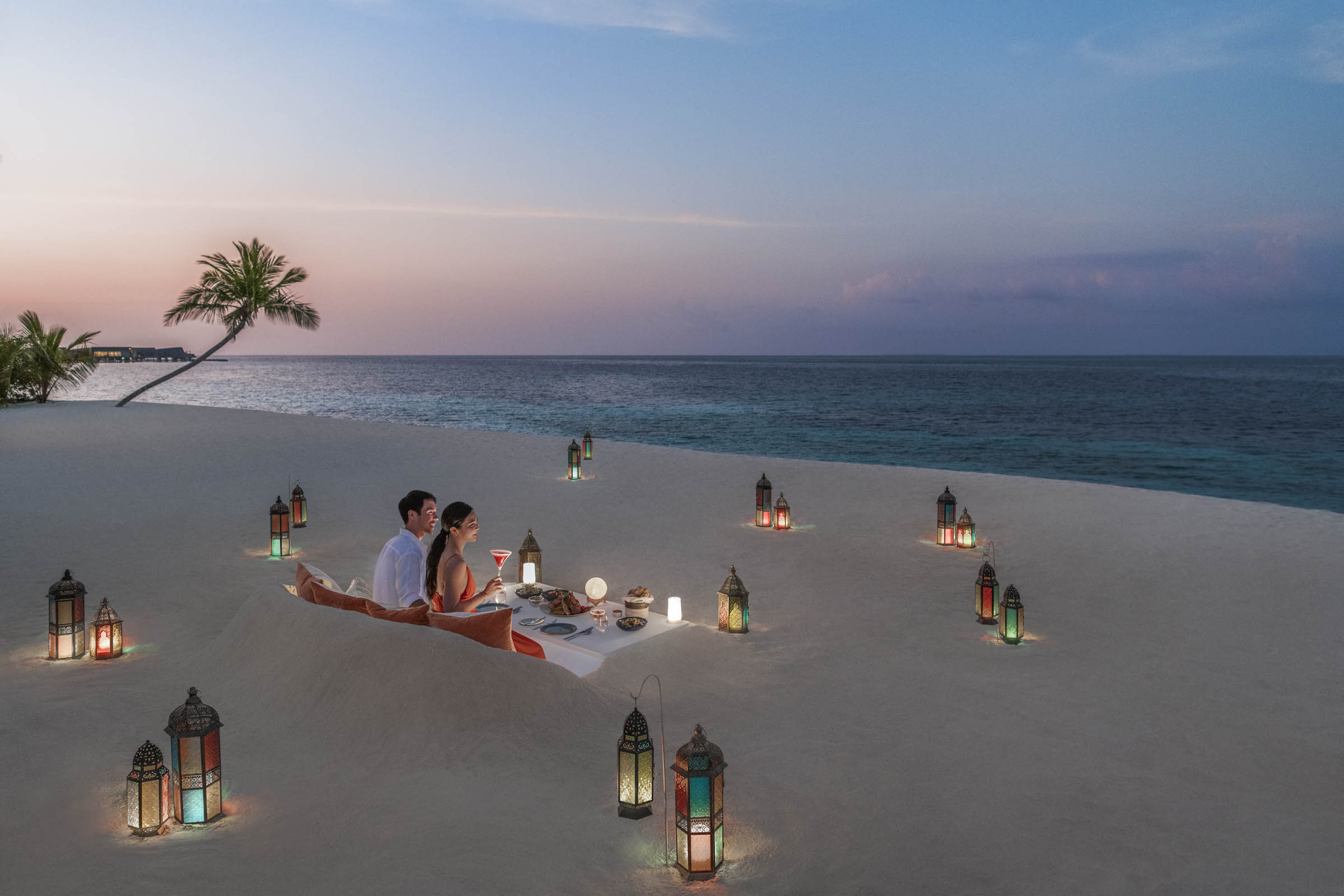
The St. Regis Maldives Vommuli Resort has unveiled an intimate celebration of love through an exclusive collaboration with IVAR Jewellery, bringing together craftsmanship, emotion, and timeless romance in a refined island setting. Rooted in shared values of artistry and enduring beauty, the partnership invites guests to experience love as something continuous, evolving, and deeply personal.
Central to the collaboration is IVAR’s Infinity Collection, inspired by the circle as a symbol with no beginning and no end. Each piece reflects a quiet and enduring expression of love, designed to preserve fleeting moments in lasting form. The collection speaks to intimacy, connection, and the promise of forever, offering jewellery that is both meaningful and timeless.
IVAR’s creations draw on the rich traditions of Indian craftsmanship, reinterpreted through a contemporary design approach. Crafted by skilled artisans using time-honoured techniques, each piece balances heritage with modern elegance. Designed for daily wear and long-term appreciation, the jewellery is intended to accompany life’s most significant milestones and be treasured across generations.
Inspired by this philosophy, The St. Regis Maldives Vommuli Resort has curated a series of romantic experiences that reflect the elegance and symbolism of the Infinity Collection. At Iridium Spa, couples are invited to enjoy a Romantic Spa Escape, an immersive sensory journey infused with rose geranium and rose quartz. Each treatment is designed to restore balance, deepen connection, and create moments of calm intimacy that extend beyond the spa.
As evening approaches, romance continues with Valentine’s dining experiences set beneath open skies and framed by the island’s natural beauty. Soft lighting, refined menus, and an unhurried atmosphere encourage couples to linger, connect, and celebrate togetherness. Every detail is composed to honour shared moments and the quiet luxury of presence.
For couples preparing to begin their next chapter, IVAR’s Solitaire Collection offers a classic expression of commitment. Defined by diamonds of exceptional brilliance and clarity, each piece reflects the purity of the promise it represents. Set within the surroundings of The St. Regis Maldives, weddings become personal celebrations where elegance, emotion, and artistry come together.
Through this collaboration, The St. Regis Maldives Vommuli Resort and IVAR Jewellery invite guests to experience a love that is both effortless and profound, fleeting yet enduring, creating memories inspired by the infinite symbol that lies at the heart of the partnership.
Featured
Cinnamon Hotels & Resorts Maldives launches March flash offer with savings of up to 80%

Cinnamon Hotels & Resorts Maldives has announced a limited-time flash offer inviting travellers to experience the Maldives in March, one of the destination’s most favourable months, with savings of up to 80 per cent when booking direct. The promotion is available across all four Cinnamon resorts in the Maldives and combines discounted rates with added island experiences, allowing guests to enjoy the destination during a period of ideal weather conditions.
The offer is open for bookings from 23 January to 2 February 2026, for stays between 1 March and 31 March 2026, using the promotional code MARCH26.
Guests booking under the offer can look forward to a range of experiences, including diving and snorkelling excursions with opportunities to encounter manta rays, reef sharks and sea turtles. On land, activities include island hopping, sunset fishing trips, Balinese spa treatments and four-course beachfront dinners. Guests staying a minimum of three nights are also eligible to receive resort credits of up to USD 150, providing additional value during their stay.
At Cinnamon Dhonveli Maldives, guests booking direct may select any two island experiences, or enjoy up to all available benefits once per stay depending on their GHA DISCOVERY membership tier, along with USD 100 in resort credits for stays of three nights or more. Available experiences include a beach dinner, a Balinese massage, a swim and snorkel excursion, and a local island visit.
At Cinnamon Velifushi Maldives, guests may select any two island experiences, or enjoy up to all benefits once per stay depending on their GHA DISCOVERY membership tier, together with USD 150 in resort credits for qualifying stays. Available options include a beach dinner, a spa treatment, island hopping and dolphin watching.
At Cinnamon Hakuraa Huraa Maldives, guests may select any two island experiences, or enjoy up to all benefits once per stay depending on their GHA DISCOVERY membership tier, along with USD 100 in resort credits for stays of three nights or more. Experiences include sunset fishing, island hopping, a bottle of sparkling wine and a kayaking experience.
At Ellaidhoo Maldives by Cinnamon, guests booking direct may select any two island experiences, or enjoy up to all benefits once per stay depending on their GHA DISCOVERY membership tier, together with USD 100 in resort credits for qualifying stays. Available experiences include a beach dinner, a Balinese massage, sunset fishing and a dolphin safari.
Under the GHA DISCOVERY membership programme, Silver tier members may select two benefits, Gold tier members may select three benefits, and Platinum tier members are entitled to all listed benefits once per stay.
In addition, GHA DISCOVERY members who book direct are eligible for further privileges, including the ability to earn and redeem DISCOVERY Dollars, potential room upgrades up to suite category, and early check-in and late check-out, subject to availability and membership tier.
Available for a limited time, the flash offer is designed to encourage travellers to visit the Maldives in March, when weather conditions are favourable and island experiences are at their most appealing.
-
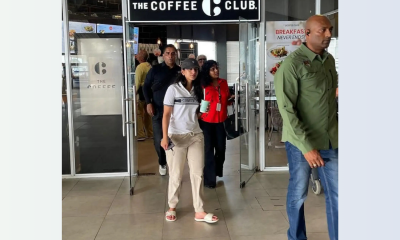
 News6 days ago
News6 days agoAmbani family members holiday in Maldives again
-
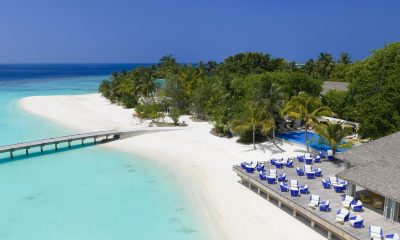
 Featured1 week ago
Featured1 week agoPulse Hotels & Resorts unveils eco-chic Eri Maldives in North Malé Atoll
-
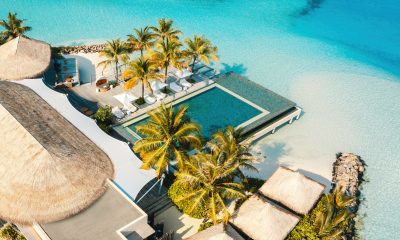
 News1 week ago
News1 week agoInterContinental Maldives unveils luxury experiences designed for solo traveller
-
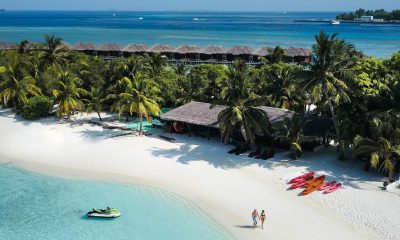
 Featured1 week ago
Featured1 week agoEndless Summer awaits at Sheraton Maldives Full Moon Resort & Spa
-

 Love1 week ago
Love1 week agoFive days of Valentine’s experiences at Cinnamon Hakuraa Huraa Maldives
-
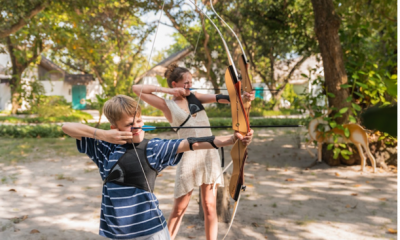
 Featured1 week ago
Featured1 week agoFrom Lunar New Year to Easter: Sirru Fen Fushi reveals seasonal line-up
-
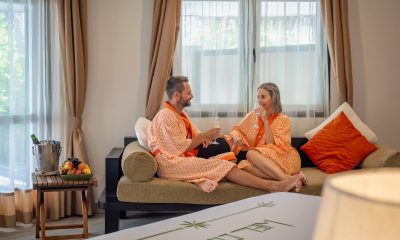
 Love1 week ago
Love1 week agoAngsana Velavaru unveils Valentine’s Day experiences
-
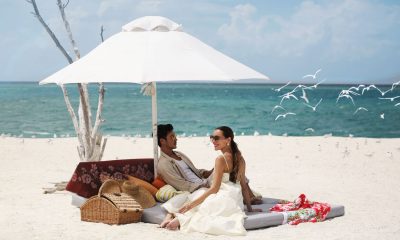
 Featured7 days ago
Featured7 days agoThe Standard, Maldives unveils romantic Valentine’s Day experiences



